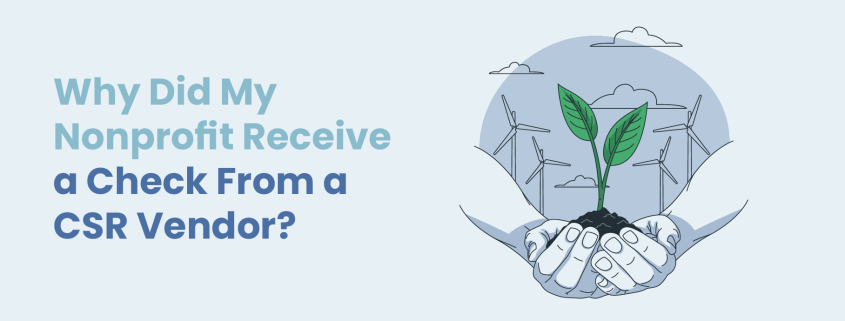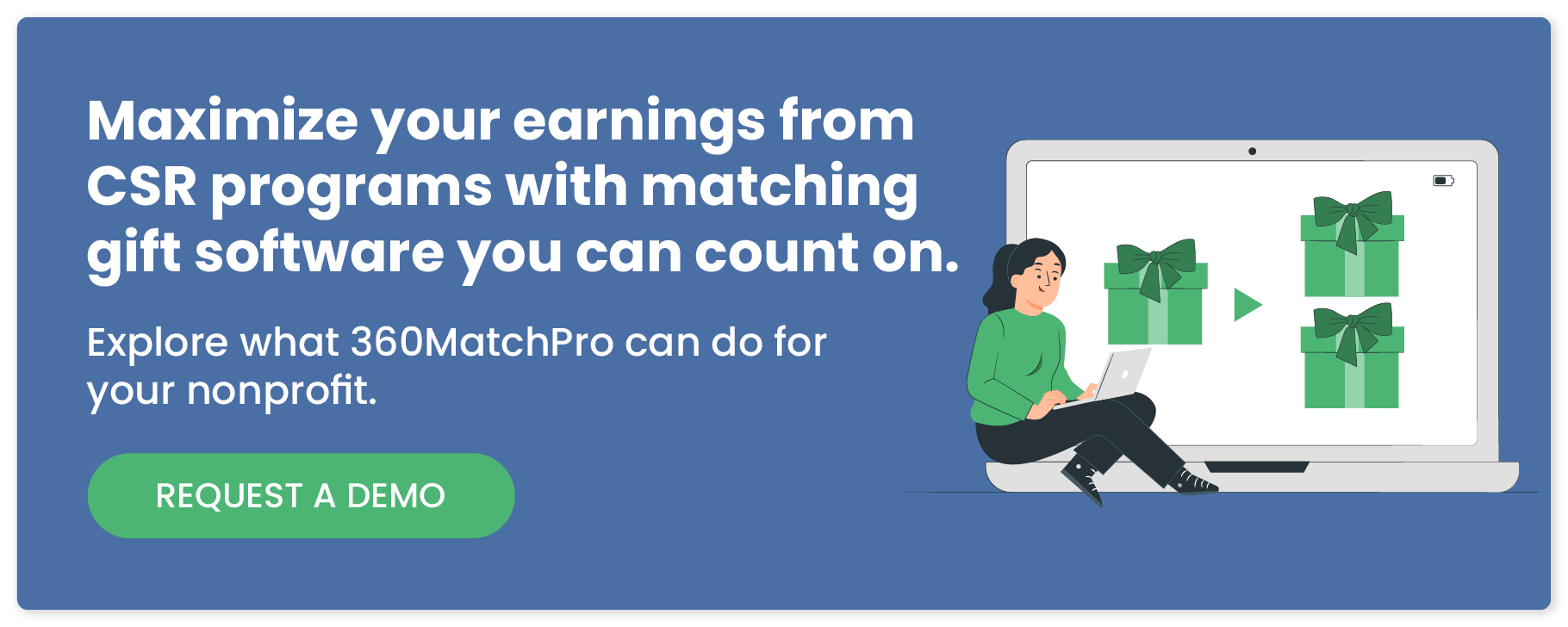Why Did My Nonprofit Receive a Check From a CSR Vendor?
Picture this familiar scenario: when going through your nonprofit’s mail you notice a check from a company you’ve never heard of before. After conducting a quick Google search, you determine that the sender is a CSR software vendor.
But why did they send your nonprofit money? And what does this mean for your organization?
In this guide, we’ll provide insight into the world of CSR vendors by covering the following key topics:
- What Are CSR Vendors?
- Popular CSR Vendors to Look Out For
- Where Do CSR Vendor Checks Come From?
- What Should I Do After Receiving a CSR Vendor Check?
- Why Is This Important for My Nonprofit?
Growing your knowledge of corporate giving software enables your team to better manage your fundraising efforts, engage with donors and corporations, and collect more revenue.
Ready to learn more about these innovative solutions with our complete guide? Let’s dive in!
What Are CSR Vendors?
The “CSR” in “CSR software vendor” stands for corporate social responsibility. Essentially, this is the practice of businesses enacting policies to conduct social good. It includes several different types of initiatives, such as internal practices like decreasing carbon footprint and providing safe working conditions. However, the part that really matters to nonprofits receiving CSR vendor checks is corporate philanthropy.
CSR and corporate philanthropy have different meanings, but corporate philanthropy falls under the umbrella of CSR. This means when a business donates to a nonprofit, it is conducting both CSR and corporate philanthropy.
On the surface, corporate philanthropy might sound straightforward, but most businesses are strategic in their approach and want to give to nonprofits in different and sometimes complex ways.
To simplify the processes involved in corporate philanthropy, CSR vendors provide businesses with software to help them organize, track, and manage their corporate giving efforts.
Though specific functionality varies by provider, CSR vendors may help businesses conduct programs such as:
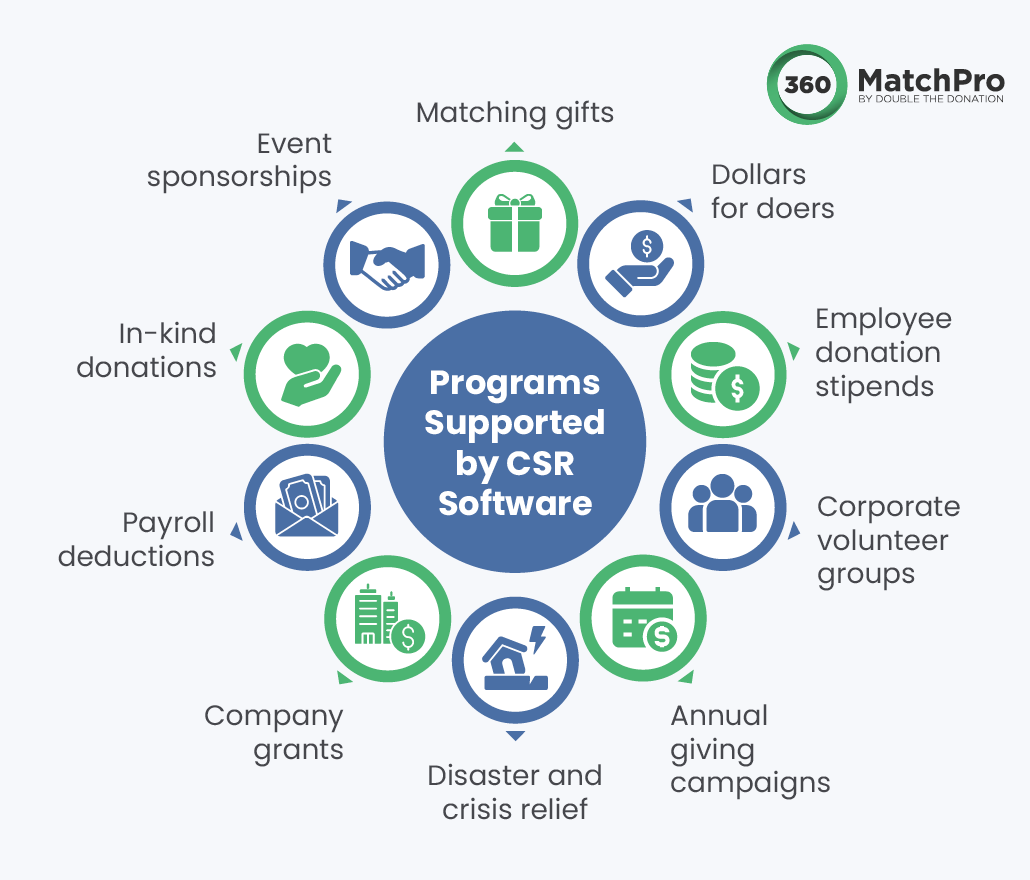
- Matching gift programs
- Dollars for doers
- Employee donation stipends
- Corporate volunteer groups
- Annual giving campaigns
- Disaster and crisis relief
- Company grants
- Payroll deductions
- In-kind donations
- Event sponsorships
If your nonprofit promotes any of these corporate giving programs to supporters, you’re likely to become quite familiar with receiving checks from CSR vendors. Ultimately, your nonprofit will rarely interact with CSR vendors or their products with one exception we’ll explore soon.
Popular CSR Vendors to Look Out For
While your nonprofit has no need to purchase a CSR platform for your own fundraising efforts, understanding key players in the industry can help you maximize your corporate partnership revenue. After all, you need to know the names of corporate giving vendors so you can keep an eye out for their checks! Plus, knowing which organizations are legitimate CSR vendors can help prevent fraud.
There’s a wide world of CSR vendors, so chances are your nonprofit will run into a few for the first time when you get a check from them. That being said, here’s a short list of a few popular ones to be aware of:

- Benevity is a Canadian-based B Corp, founded in 2008, that provides companies with powerful solutions for employee donations, gift matching, volunteerism, and community grant management.
- YourCause is a CSR platform powered by Blackbaud that provides businesses with numerous features related to CSR, such as disaster relief, campaign giving, peer-to-peer fundraising, matching gift tools, and more.
- Bonterra, formally CyberGrants, is a new giant in the CSR space. Bonterra offers a wide range of software solutions related to social good, and for CSR, they offer a comprehensive platform for companies to manage their grantmaking, volunteerism, and matching programs.
While these are the top three providers, tons of other smaller CSR vendors also provide businesses with the tools they need to manage their workplace giving initiatives. These alternatives are especially important to pay attention to if you have many local donors who work for small businesses.
Here are a few more platforms you might see:

- Selflessly was developed in 2018 as an affordable CSR management platform for small and mid-sized companies looking to improve and expand their employee giving, corporate matching, and volunteering efforts.
- Millie brings their corporate clients innovative and flexible tools for managing their volunteering, donation matching, employee giving stipends, grants, and more.
- Point is a social impact platform designed to aid both nonprofits and companies in managing corporate giving contributions. On the corporate side, Point offers donation matching, employee volunteerism, in-kind giving management, and more.
- America’s Charities is one of the first CSR vendors to roll out digital workplace giving features. Since then, this platform has helped manage matching gifts, volunteerism, grantmaking, and other forms of workplace giving.
- Bright Funds provides companies of all sizes with innovative solutions for payroll integrations, corporate volunteerism, gift matching, grant management, and extensive reporting.
If one or more of these companies crop up as “donors” in your fundraising CRM, it means your organization is benefiting from corporate philanthropy. However, unlike your other donors, there’s no need to reach out to them with a thank you. They’re just doing their job!
As such, make sure these contributors are marked in your database as CSR vendors. This way, you can properly attribute gifts to the individual donors who secured the company match on your behalf rather than the software provider that delivered it.
CSR Vendors vs. Matching Gift Software
Now that you have a baseline understanding of corporate giving vendors, you might have questions about how their software compares to yours. After all, “matching gifts management” is a core feature offered by many CSR vendors, but none of the organizations we’ve discussed are alternatives to nonprofit matching gift software like 360MatchPro.
The simple answer is that corporate social responsibility vendors facilitate businesses’ matching gift programs while matching gift software helps donors access those programs when giving to a nonprofit. Some CSR platforms have employee portals where workers can submit matching gift applications to their employer, but this differs from matching gift software, which serves to help donors discover their eligibility during the donation process.
To view these software differences in more detail, take a look at this overview of CSR vendors and what they do:
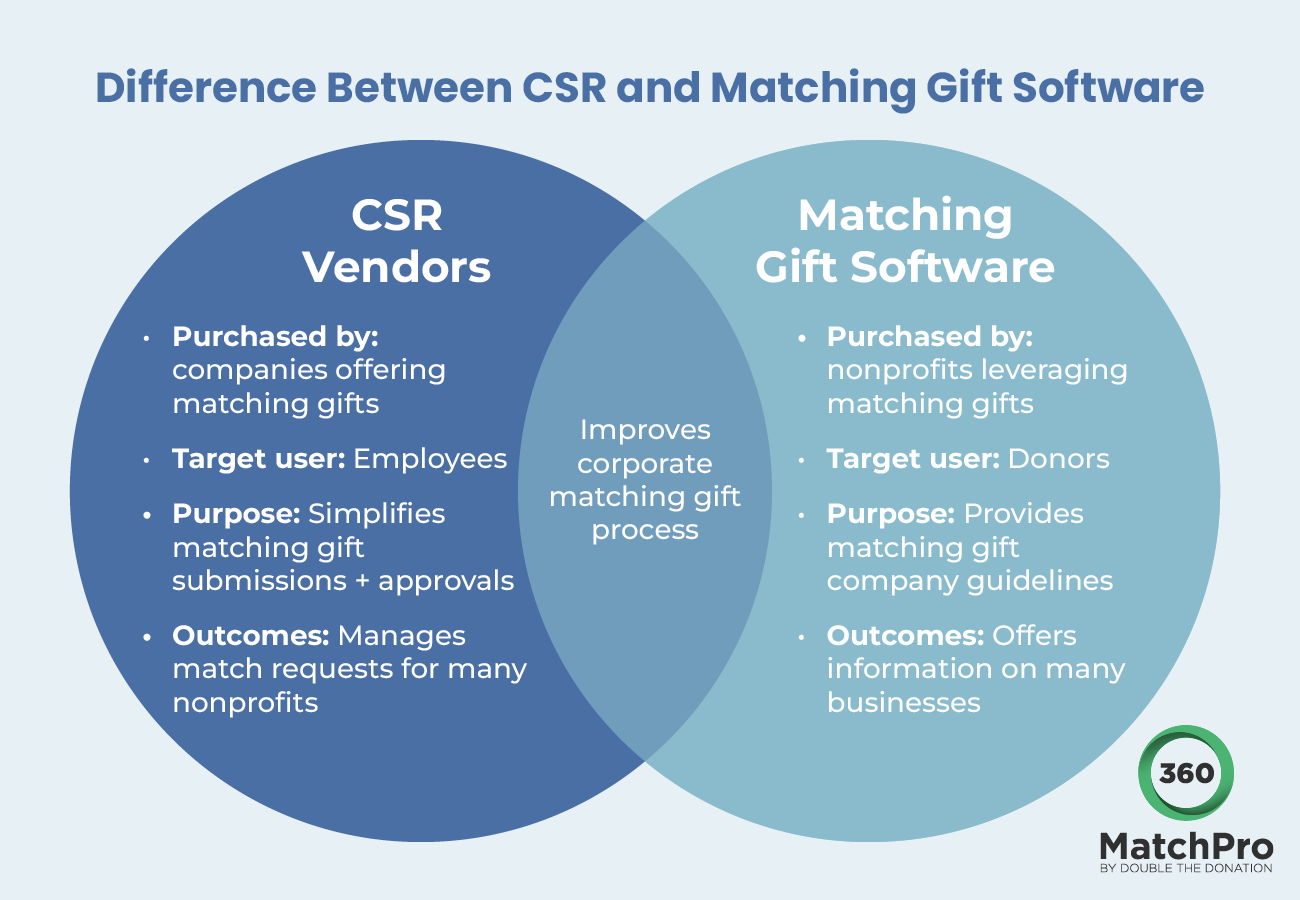
- This type of software is typically purchased by companies offering matching gifts. Matching gift software is purchased by nonprofits.
- The target users for the software are the purchasing company’s employees who are interested in participating in workplace giving opportunities and the company’s leaders overseeing their organization’s CSR efforts. The target users for matching gift software are nonprofit donors looking to determine whether their past or future gifts are eligible for company matches.
- CSR management software simplifies matching gift submissions and approvals for both employee donors and company leadership. Matching gift software is accessed by your donors to discover their matching gift eligibility, at which point they would then log into their employer’s CSR software to actually fill out the matching gift request application.
- CSR platforms often manage matching gift requests for thousands of nonprofit organizations, while matching gift software provides information on thousands of businesses to your nonprofit’s donors.
When employee donors complete an online gift, they will use both matching gift and CSR software.
For example, many nonprofits embed a matching gift company search tool within their donation form or gift confirmation page. Here, donors are prompted to enter their employer’s name in the provided search bar to retrieve the company’s matching gift program guidelines and submission forms from a comprehensive database.
When donors follow the matching gift request instructions provided by the database software, they will usually need to access their employer’s CSR software at some point in the process. Typically, this involves navigating to the employer’s CSR employee portal to complete a matching gift request after submitting their initial donation.
CSR Vendors with Matching Gift Auto-Submission
The only time it matters to your nonprofit what type of CSR software a business uses is when it comes to matching gift auto-submission.
Auto-submission is a unique matching gift tool currently available exclusively to nonprofits using 360MatchPro. When employee donors give to these nonprofits, some of them may be able to have their matching gift requests completed and submitted automatically for them.
This is because a few select CSR vendors have partnered with 360MatchPro to provide auto-submission to their clients. If the employer uses one of these vendors and the employee gives to a nonprofit with 360MatchPro, they can opt into auto-submission. Here’s how one of these CSR vendors, Selflessly, explains the process and its benefits:
Upon submitting their gift, the user is redirected to a donation confirmation page, complete with detailed information about their employer’s matching gift programming. This allows them to quickly determine whether they qualify and identify the next steps.
In the past, this is where the process ended. No more visibility for the nonprofit, no further guidance for the user, and lowered utilization rates for companies. Now, thanks to the pioneering partnership between Selflessly and Double the Donation, an eligible donor is simply asked to enter their corporate email address using an embedded widget in the confirmation screen. Then, by checking the included box, the employee authorizes Double the Donation to submit their matching gift request to their employer through Selflessly.
That’s it! The rest is handled automatically by Selflessly with the submission able to be reviewed and verified as usual–the end goal of the gift match being approved by the employing company and dispersing funds to the organization with ease and speed.
In other words, auto-submission improves the matching gift process for everyone involved since:
- Submitting a request to an employer takes just the click of a single button,
- Employee donors spend less time filling out forms
- Businesses can ensure their employee giving programs are being used
- CSR vendors can provide more functionalities to their customers.
To learn more about the technology behind auto-submission, check out this video from our team at Double the Donation:
Where Do CSR Vendor Checks Come From?
CSR vendors are the ones writing the checks your nonprofit receives, but it’s not their money that’s being spent. Here’s a breakdown of just where checks from CSR vendors come from:
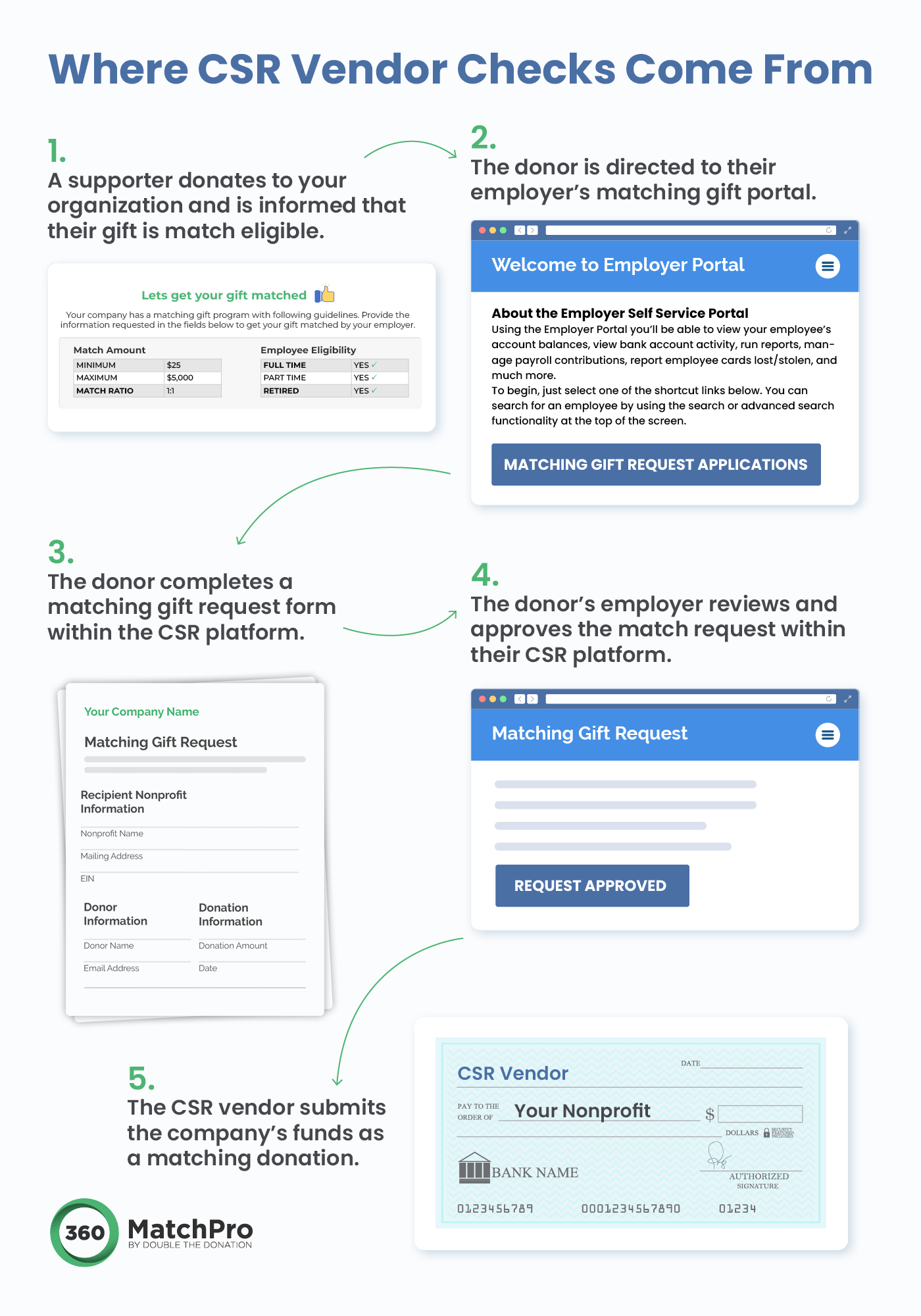
- A supporter donates to your organization and is informed that their gift is match-eligible.
- The donor is directed to their employer’s matching gift portal, which is hosted on a CSR platform.
- The donor completes a matching gift request form within the platform, providing required details such as a gift receipt, your nonprofit’s EIN, and their contact information.
- The donor’s employer reviews and approves the match request within their CSR platform. Company funds are allocated to fulfill the required match amount.
- The CSR vendor processes the approval and submits the company’s funds as a matching donation to your organization.
When all you see is a donation from a CSR vendor you’re not familiar with, it can be a bit more difficult to put together the puzzle pieces. But taken step-by-step, the matching gift request and disbursement process make sense, and it’s clear who started the process and where the money comes from.
The big takeaway here is that the funds your nonprofit receives from a CSR vendor are ultimately coming from a corporation at the urging of one of their employees. Think of the CSR vendor as a package delivery man rather than the person who bought the package and brought it to the post office for shipping.
What Should I Do After Receiving a CSR Vendor Check?
You have received a check from a CSR vendor due to a supporter requesting a matching gift. What now?
We recommend following these procedures:
- Designate the gift as a company match. Identify the donation check as one from a CSR vendor through a corporate matching gift program. One of the easiest ways to do this is by becoming familiar with CSR vendors that distribute matching gift donations. When you see one of these providers in your donor records, know to flag it as a corporate gift.
- Determine which supporters indicated they’d requested a match. It can sometimes be difficult to correctly associate a donation match you receive with the supporter who requested it on your behalf. That’s why it’s important to keep in close contact with your donors—especially those who are flagged as match-eligible. After a donor gives, follow up with them to encourage them to request a match. Use your matching gift software’s communication tools to give them the option to confirm that they have submitted their matching gift request. This way, you can easily determine which supporters to credit for your donation matches.
- Enlist matching gift automation to streamline the process. You might be concerned that your organization lacks the time, resources, and workforce necessary to follow up with each donor and identify those who have or will request donation matches. That’s where matching gift automation comes in! With the right software, you can configure post-transaction communications to be automatically triggered at various points in the giving experience. This might include submitting a donation, a donor confirming they’ve requested a match, and receiving a check from a CSR vendor for the appropriate amount.
- Thank your matching gift donors for their support. Once you know which donors have requested matches for gifts, you can thank them for going above and beyond in their support. Be sure to share your appreciation both when they initially indicate that they’ve requested a match as well as once you receive the corporate donation.
- Record and analyze matching gift data. Throughout the process, you’ll collect a range of information that can help as you measure your matching gift fundraising success and discover areas for improvement. Tracking this data over time lets you gain a better understanding of your donors, their employers, and the role CSR vendors play in it all.
When you adopt the above suggestions, you ensure your organization is all set to continue receiving CSR checks. Remember, the important part of receiving a CSR check is thanking the supporter who made it happen!
Why Is This Important for My Nonprofit?
So what does this all mean? After all, in normal circumstances, your nonprofit never needs to contact a CSR vendor. Of course, that’s the secret: when you receive a CSR vendor check, it’s not about the CSR vendor. It’s about your donors and your nonprofit.
By knowing what goes on behind the scenes when you receive corporate gifts, your nonprofit will receive benefits like:
- Effective data management: Keeping your fundraising database as clean and organized as possible makes every part of earning donations easier. Records in your CRM that don’t accurately reflect the nature of the donations may become a problem and lead to confusion over time. If you have corporate gifts sorted and documented by their association with specific donors, you can quickly and easily determine where they came from and how to treat them.
- Improved donor relations: Checks from CSR vendors come from corporate giving programs, most of which are the direct result of donors requesting gift matches from their employers. Although these bonus gifts don’t come directly from your donors’ wallets, recognize that the contributions would not have been possible without their support and dedication to your cause. Stay in touch with donors after they request their corporate match, and be sure to thank them at every step along the way. This can significantly benefit your donor relationships and prevent you from accidentally thanking a confused CSR vendor!
- Corporate fundraising opportunities: If donors don’t believe their company match made a difference—or even made it to your organization—they may not try to secure a match for future gifts. By taking the time and effort to steward the corporate donation effectively, you’ll set your team up to receive more corporate revenue to benefit your mission.
When it comes to managing workplace giving checks by CSR vendors, following the steps outlined above will help ensure success going forward. The better your corporate fundraising efforts, the more you’ll raise through this channel in the future.
Additional Corporate Giving Resources
CSR vendors are important but almost invisible players in the social good sector. Save your team from confusion and make the matching gift process better for donors by recognizing contributions delivered by CSR vendors, properly categorizing, and taking steps to find the supporters responsible for the mysterious checks arriving at your door.
Of course, CSR vendors are just one small part of the world of corporate philanthropy. Discover more about the programs your nonprofit can tap into and software you can leverage to take advantage of these initiatives:
- Workplace Giving: The Guide for Nonprofits and Companies. You’re already benefiting from workplace giving programs, but don’t leave available dollars on the table! Find out how to leverage workplace giving to make the most of it for your organization.
- Corporate Philanthropy: A Comprehensive Resource for Nonprofits. Employee giving is just one form of corporate philanthropy. Learn more about this broad category of fundraising possibilities with this blog post from re: Charity.
- Matching Gift Databases: What to Know + Top Solutions. Matching gift databases help streamline this type of fundraising for nonprofits and donors. Explore the top solution and what to look for with our guide!

